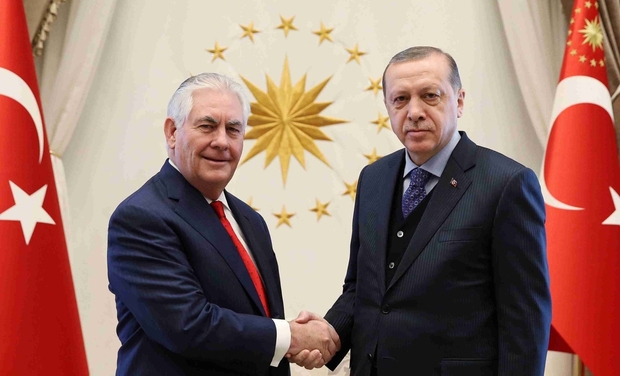A recent prison sentence against a Turkish-American NATO scientist represents the latest point of contention in strained Turkey-U.S. relations. Ankara’s persistent threats to expand an ongoing military offensive against Kurdish enclave of Afrin in northwestern Syria toward Manbij, another Kurdish-held city home to U.S. special forces, causing fresh distress on the ties.
This week, U.S. Judge Richard Berman rejected a request to reject jury’s findings against a Turkish banker in a sanctions-busting trial that involved senior Turkish politicians and scandal-buffeted businessmen, who once had close ties to President Recep Tayyip Erdogan.
The judge confirmed the January conviction of Mehmet Hakan Atilla, an executive state-run Halkbank in Halkbank.
Against this backdrop, U.S. Secretary of State Rex Tillerson will be in Turkey next week for talks to resolve the controversial issues that bedevil a healthy relationship between two NATO allies.
Late last month, Ankara began a cross-border offensive in northwestern Syria against what it calls a “terrorist” Kurdish militia supported and armed by Washington whose troops are back local militias against the Islamic State group (ISIS).
The Turkish operation further raised tensions between the two countries, whose relations were already complicated.
“We are urging them to show restraint in their operations in Afrin, and to show restraint further along the line across the border in northern Syria,” a senior U.S. State Department official told reporters ahead of Mr. Tillerson’s tour that begins Sunday and will also take him to Cairo, Kuwait City, Amman and Beirut.
“You start with asking for restraint and look for ways that you can help bring it to an end as quickly as possible,” the official said, speaking on condition of anonymity.
President Erdogan has called on the U.S. to pull its troops back from Syria’s Manbij, which is east of Afrin.
“Obviously we need to work with the Turks to figure out more about what their long-term intentions are,” and to try to find a way “to address their legitimate security concerns while, at the same time, minimizing civilian casualties and above all else keeping everything focused on the defeat-ISIS fight, which is not over,” the official said.
It will be “a difficult conversation,” the official continued, referring to the “very hot” Turkish rhetoric on the subject.
Mr. Tillerson’s visit is also expected to touch on other sensitive topics.
These include human rights and arrests that the U.S. called “arbitrary” following a state of emergency declared after an attempted coup in 2016.
Turkey last year detained local employees of American diplomatic missions in the country and arrested Taner Kilic, the president of Amnesty International in Turkey.
“There are no pulling punches on that,” a second senior State Department official said.
“We’ve been very public in our call to the Turks to let these folks go, and we’ve been very firm in our private conversations with them as well.”
He conceded: “The Turks are angry and this is a difficult time to do business.”
But Washington believes the two countries share fundamental underlying interests including Syria’s stability, the defeat of ISIS, and countering the Kurdistan Workers’ Party (PKK) which both Ankara and the West consider terrorists.




Comments are closed.